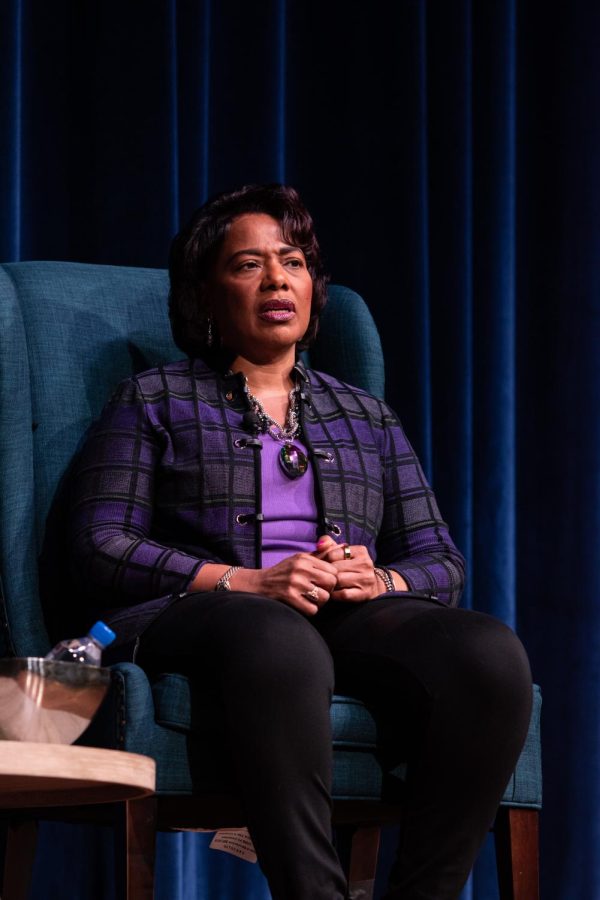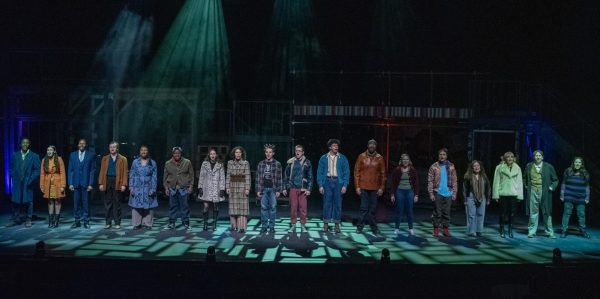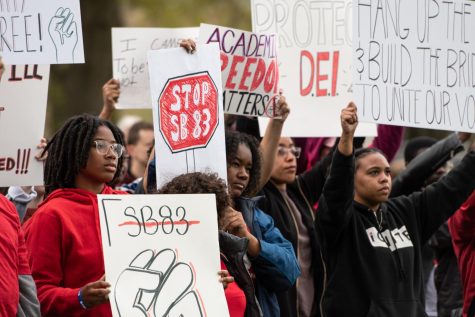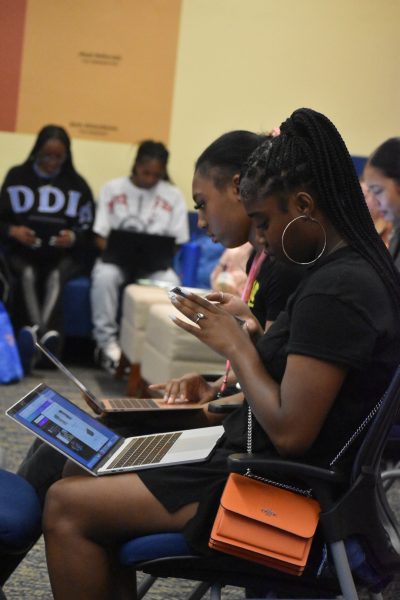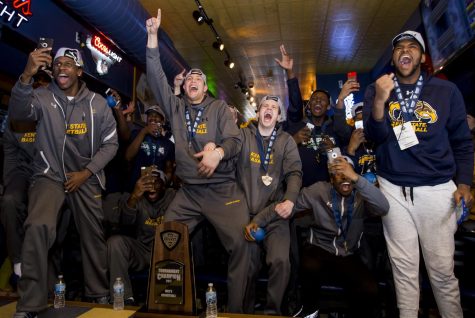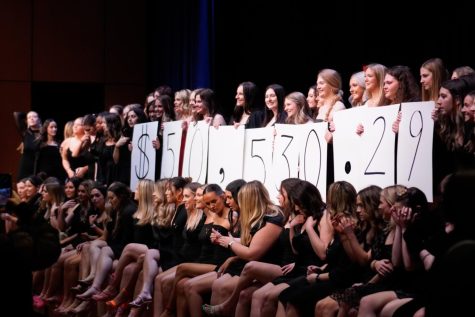Dr. Bernice King kicks off Black History Month celebration
Dr. Bernice A. King speaks on topics such as her father’s legacy, what it means to be Black in America and the values of practicing non-violence during the keynote speech at Kent State on Feb. 2, 2023.
Alexandria Manthey, TV2 Reporter
February 3, 2023
To cap off the week of Kent State’s annual Martin Luther King Jr. Celebration, a sold-out crowd gathered to listen to Dr. Bernice King, daughter of Coretta Scott and Martin Luther King Jr.
Bernice King is the carrier of many monikers; mainly, she’s the CEO of the King Center in Atlanta founded by her mother Coretta Scott King in 1968.
The goal of the center is to be “…a living memorial filled with all the vitality that was his, a center of human endeavor, committed to the causes for which he lived and died” according to their website.
King has also championed many programs at the center, including Camp N.O.W Leadership Academy, Beloved Community Talk and a mentoring program called “Students with King.”
Thursday’s program began with a rendition of the Black national anthem, James Weldon Emerson’s “Lift Every Voice and Sing.”
President of Diversity, Equity and Inclusion (DEI) Dr. Amoaba Gooden, University President Todd Diacon and Student Multicultural Center President Michael Daniels gave anecdotes, with Diacon discussing a new phrase he’d learned just earlier that day leaving a flight.
“As we were exiting the airplane, the flight attendant said something that probably has been said (…) a million times by a million different people,” Diacon said. “She said, ‘Please take care of yourselves so that then you can take care of others.’ It’s a saying that I’m sure is well known (…) [but] I think now more than ever, it’s a saying that we want to say and embrace.”
Black United Students president Deanna Baccus gave the real introduction as King took the stage, giving Baccus a hug.
English Professor Uma Krishnan had a brief list of questions that invoked King’s work in emotional regulation and social justice.
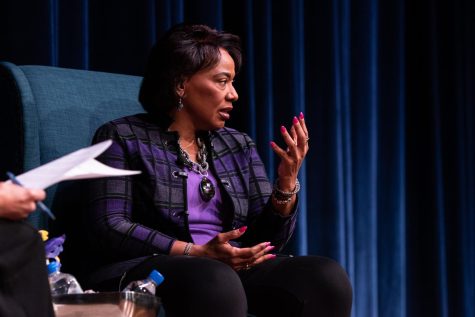
“The emotions that we all have,” King said, “and the experience at different times in our life are real, sometimes very dark. In most situations I know it’s not conductive, to allow myself to be controlled by them […] I had all of these emotions inside of me that I was carrying and it wasn’t until I started addressing understanding that they exist [and] they’re not going to necessarily go anywhere. I have now some more skills to be able to channel them to understand them even to begin to understand triggers.”
King also shared experiences with being the daughter of two American historical icons and what comes along with that lineage. King shared a sentiment her late mother told her, clearly aware of what would follow their children as they grew into adulthood.
“My mother helped me very early in my life,” King said. “She would always say to me ‘look, I want you all to know that you don’t have to be me, you don’t have to be your father, but whatever you do in this life, do your best self.’ You don’t know how many times that has been helpful to me because people come with a lot of expectations.”
In an answer to a question from Krishnan, King opened up about the psychological hoops many Black Americans jump through daily.
“It’s hell to be a Black American,” she said. “Being who I am, I don’t have a sign that says, ‘Hey, I’m the daughter of Martin Luther King Jr.’ […] It’s like, you’re hyper racially conscious and you shouldn’t have to live that way and you’re conscious in a way, from a negative standpoint, meaning you are always on guard […] especially if you are in predominantly white environments.”
King reflected on being one of two people of color in a law class at Harvard and how this negatively affected her, especially without any support at Harvard.
“When I was in the class of close to a hundred some students and I was one of two Black kids, I felt like I was carrying the weight of the Black community.” she said. “Because as a Black person, when I mess up, all Black people mess up.”
King also shared her anxieties about driving, especially in the south, and how her ancestry can’t protect her in the environment of policing.
“I was telling somebody when I drive in the south,” she said. “I’m constantly thinking, ‘Lord, I just pray we never get pulled over. […] I shouldn’t be thinking I’m Dr King’s daughter; it doesn’t matter [what] class you are, doesn’t matter the celebrity status you might be, you’re still Black.”
However, King did provide a statement of comfort for the audience, reminding them that America couldn’t exist in it’s current state without the work and inventions of Black
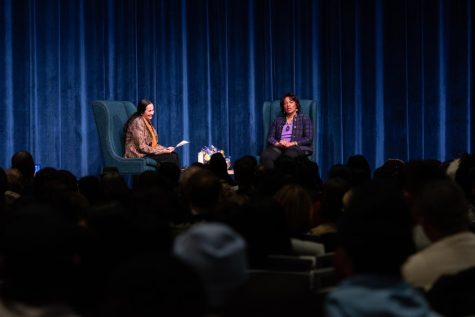
people.
“Now, on the other hand,” she said. “I’m saying to my brothers, and so they asking the question ‘what does means Black in America?’ I sum it up this way, America is because we are. [I saw] a posting was on LinkedIn or where. But it said, ‘imagine the world’ and it listed all these different things that Black people invented […] Imagine the world without all that stuff. I mean, there is so much that Black America has contributed to this nation […] it blows your mind.”
Undergraduate Student Government Senator Lauren Akainyah came to King’s speech for inspiration and was comforted by her remark of “America Is As We Are.”
“With the recent events that have occurred over the past few years and the most recent event with Tyre Nichols, I was just looking to get inspired,” she said. “She talked about how many things we wouldn’t have if Black people were not here and that just made me feel so emotional because I felt like she was speaking to me and my fellow brothers and sisters.”
President Diacon explained the university’s plans to support Black students in light of recent hate speech written in Oscar Richie hall.
“Here’s the great thing about our students and our student leaders,” he said. “They’re the ones that know the way […] what am I gonna do is really listen as much as I can and implement as much as what is suggested. […] I know that we’ll be doing some more reviews of security cameras and that, and then it’s always just a fine line between informing people of things that happen in terms of graffiti and then encouraging copycat actions. So we’re just trying to figure out the world we live in.”
Grace Davies is a staff reporter. Contact her at [email protected].


